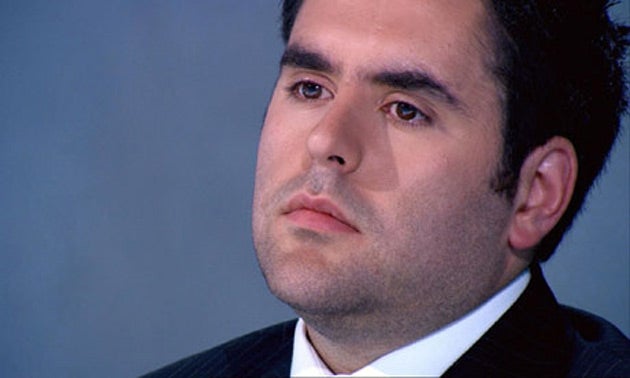Last Night's TV: Edwardian Farm/BBC2<br />Ancient Worlds / BBC2<br />The Apprentice/BBC1

Did Ruth, Alex and Peter spend a brief layover in the 21st-century while in transit from Victorian to Edwardian England, I wonder? You may remember these three as the unaccountably cheerful trio of have-a-go-historians who lived for a year on Victorian Farm, spurning modern conveniences and doing everything the hard way. Now – with barely a break for rest and recuperation – they're doing something similar for the Edwardian period, pulling on the itchy underwear and setting up in Morwellham Quay, a Victorian farm and mining port on the River Tamar. Since Morwellham Quay is an open-air museum and heritage visitor centre one assumes there must be a car park somewhere, not to mention a gift shop and a café, but if so they've all been carefully excluded from the frame, the better to maintain the illusion of time travel. Our proxy Edwardians arrived in the early morning, through a haze of Tamar river mist and orchestral bombast that suggested they were passing through a portal in time.
Ostensibly, this sort of thing is all about us understanding the past a bit better. In truth – while it certainly does quite a bit of that – its core pleasure is in getting us to appreciate the present a bit more, with a vivid demonstration of just how grinding life used to be. The team had barely been in their new accommodation for five minutes, for instance, before Ruth – a woman who possesses so much elbow grease that she could probably can the overflow to sell on the side – was on her knees in the kitchen, scrubbing the stone flags into decency. The men, meanwhile, were leaning pensively on a farm gate taking advice from a local, Mr Mudge, who looked as if he genuinely had been born in 1840. What should they plant in their big field, they asked. Mr Mudge muttered a stream of Devonian polysyllables in which the only decipherable word was "mangels".
There are some concessions to modern sensibilities. When it came time to clean out the cottage chimney Alex declined to drop a live chicken down the stack (highly effective, apparently, because of the soot-clearing properties of an avian panic attack), and used a holly bush instead. But to counterbalance the anachronistic sensitivity about animal welfare they also do stuff that most Edwardian farmers would have left to a specialist. Instead of simply buying the quicklime they need to spread on their fields, for instance Alex and Peter helped to stack and tend the kiln themselves, a hugely laborious task that took three days in all, and exposed them to the kind of health and safety risks that give BBC compliance officers sleepless nights. Then, when they finally stagger back home for supper, they find that it's sheep's head stew on the menu – a brown slop the texture of wallpaper paste with a reproachful-looking skull perched in the middle of it. I expect that the historical immersion will prove as popular in this case as it did with Victorian Farm. But I do hope they occasionally get to play hookey from the past and drive into Tavistock for a chicken tikka.
Ancient Worlds is a more old-fashioned kind of history programme. Richard Miles, its presenter, has not been required to pull on a loin cloth and live for a month as a Sumerian peasant. He just has to stand in the landscape and tell us things, in classical mid-Sixties presenter style. And in this regard alone the words are a bit more successful than the pictures, since he has a slightly unfortunate presentational manner, frequently looking down his nose at the lens through half-closed eyes as if auditioning for the part of a Regency rake. Somehow he even manages to walk contemptuously in the long shots, as he wanders in a bored fashion through the low piles of rubble that mark the location of ancient Mesopotamian cities.
His script, by contrast, very much gives the impression that he cares and is full of interesting things about the radical social experiment of the city-state, and the new ways of living it permitted. Full, too, of things you want to disagree with – not, in my view, a failing in a programme but evidence that it's engaging enough to argue with. I wondered, for instance, about Miles's overarching metaphor for ancient history, which was of looking down a deep well: "It gets dark so quickly," he said. "But then sometimes you catch a glimpse of something at the bottom, alive and moving and suddenly you realise that it's your own reflection looking back at you." His point was that – as alien as these civilisations are – they're just us by other means. But, to turn his metaphor against him, isn't it possible that in a wishful search for relevance you might mistake your own reflection for a true view of the bottom? Perhaps the city of Tell Brak really was "a bit like North Korea without the cult of personality". Or perhaps it was like something we wouldn't recognise at all.
Alex was finally dispatched in The Apprentice, though not without an encore for his finest soundbite: "I'm not just a corporate clone. I am always thinking out of the box." Couldn't he see that "out of the box" is as in the box as you can get? This time round though the edit gave you his next line: "If I was an apple pie the apples inside would be orange." As you were, Alex. I think it's safer if you stick to the clichés.
t.sutcliffe@independent.co.uk
Join our commenting forum
Join thought-provoking conversations, follow other Independent readers and see their replies
Comments
Bookmark popover
Removed from bookmarks